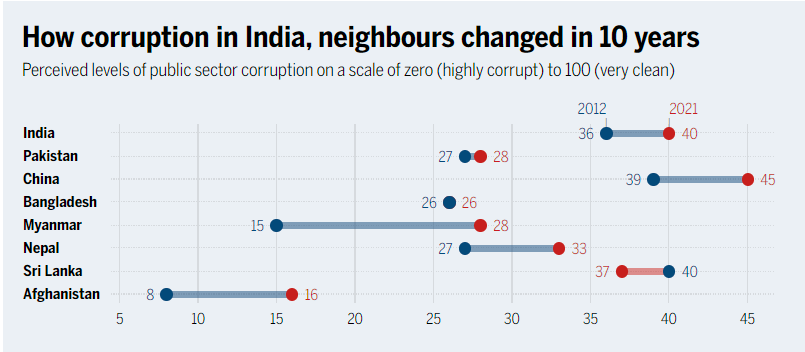Governance
Corruption Perception Index 2021
- 27 Jan 2022
- 6 min read
For Prelims: Corruption Perception Index, Transparency International, Democracy, Corruption, Jakarta Statement.
For mains: Transparency & Accountability, Important International Institutions, Common causes of Corruption and a Way Forward.
Why in News
Recently, the Corruption Perception Index (CPI) 2021 was released by Transparency International.
- Overall, the CPI shows that control of corruption has stagnated or worsened in 86% of countries over the last decade.
Transparency International
- It is an international non -governmental organisation founded in 1993 based in Berlin, Germany
- Its non-profit purpose is to take action to combat global Corruption with civil societal anti-corruption measures and to prevent criminal activities arising from corruption.
- Its most notable publications include the Global Corruption Barometer and the Corruption Perception Index.
Key Points
- About:
- The Index ranks 180 countries and territories by their perceived levels of public sector corruption according to experts and businesspeople.
- It relies on 13 independent data sources and uses a scale of zero to 100, where zero is highly corrupt and 100 is very clean.
- More than two-thirds of countries (68%) score below 50 and the average global score remains static at 43. Since 2012, 25 countries significantly improved their scores, but in the same period 23 countries significantly declined.
- Top performers:
- This year, the top countries are Denmark, Finland and New Zealand, each with a score of 88. Norway (85), Singapore (85), Sweden (85), Switzerland (84), the Netherlands (82), Luxembourg (81) and Germany (80) complete the top 10.
- Bottom Performers:
- South Sudan (11), Syria (13) and Somalia (13) remain at the bottom of the index.
- Countries experiencing armed conflict or authoritarianism tend to earn the lowest scores, including Venezuela (14), Afghanistan (16), North Korea (16), Yemen (16), Equatorial Guinea (17), Libya (17) and Turkmenistan (19).
- India’s Performance:
- India ranked 85 among 180 countries in the current index (86 in 2020 and 80 in 2019). Transparency International gave India a CPI score of 40.
- Except Bhutan, all of India's neighbours are ranked below it. Pakistan dropped 16 spots in the index and was ranked at 140.
- The country’s score has remained stagnant over the past decade, some of the mechanisms that could help reign in corruption are weakening.
- There are concerns over the country’s democratic status, as fundamental freedoms and institutional checks and balances decay.
- Anyone that speaks up against the government has been targeted with security, defamation, sedition, hate speech and contempt-of-court charges, and with regulations on foreign funding.
- India ranked 85 among 180 countries in the current index (86 in 2020 and 80 in 2019). Transparency International gave India a CPI score of 40.
- Fall of Democracy:
- From the repression of opposition supporters in Belarus, to the closing of media outlets and civil society organisations in Nicaragua, the deadly violence against protesters in Sudan and the killing of human rights defenders in the Philippines, human rights and democracy are under threat around the world.
- Increasingly, rights and checks and balances are being undermined not only in countries with systemic corruption and weak institutions, but also among established democracies.
- Since 2012, 90% of countries have stagnated or declined in their civil liberties score on the Democracy Index.
- The global Covid-19 pandemic has also been used in many countries as an excuse to curtail basic freedoms and side-step important checks and balances.
- And despite the increasing international momentum to end the abuse of anonymous shell companies, many high-scoring countries with relatively “clean” public sectors continue to enable transnational corruption.
- The current wave of authoritarianism is not driven by coups and violence, but by gradual efforts to undermine democracy. This usually begins with attacks on civil and political rights, efforts to undermine the autonomy of oversight and election bodies, and control of the media.
- Such attacks allow corrupt regimes to evade accountability and criticism, allowing corruption to flourish.
- Suggestions:
- Peoples Demand:
- To end the vicious cycle of corruption, human rights violations and democratic decline, people should demand that their governments:
- Uphold the rights needed to hold power to account.
- Restore and strengthen institutional checks on power.
- Combat transnational forms of corruption.
- Uphold the right to information in government spending.
- To end the vicious cycle of corruption, human rights violations and democratic decline, people should demand that their governments:
- Address Fundamental Failings:
- To forge ahead together in sustainable anti-corruption efforts, economic recovery strategies should address the fundamental failings that have led to many countries’ corrupt systems.
- Effective control of corruption and common prosperity can only be achieved through the engagement of informed people who are able to assemble freely, speak openly and blow the whistle on corruption without fear of reprisal.
- Anti- Corruption Agencies:
- Countries with no anti-corruption agency or weakening institutions should uphold the 2012 Jakarta Statement on Principles for Anti-Corruption Agencies, its Colombo Commentary and regional commitments such as the Teieniwa Vision, alongside all other steps required by the United Nations Convention against Corruption.
- The United Nations Convention against Corruption is the only legally binding universal anti-corruption instrument.
- Countries with no anti-corruption agency or weakening institutions should uphold the 2012 Jakarta Statement on Principles for Anti-Corruption Agencies, its Colombo Commentary and regional commitments such as the Teieniwa Vision, alongside all other steps required by the United Nations Convention against Corruption.
- Peoples Demand:
Related Indian Initiatives





